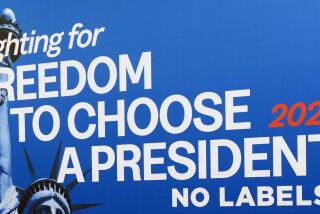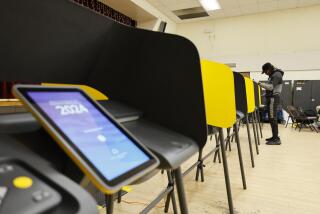Americans Elect’s effort for independent ticket in 2012 sputters
WASHINGTON -- An ambitious effort to launch a third-party presidential ticket this fall has failed to ignite interest, despite the backing of heavyweight political and business leaders and a sophisticated ballot-access program that cost $15 million.
On Tuesday, Americans Elect was forced to cancel its third consecutive primary after none of its top potential candidates mustered the minimum support needed to qualify.
That leaves the organization in an odd and unprecedented situation: It is already on the general-election ballot in 27 states -- giving it greater reach than the Green Party -- but it may not have a ticket.
The group’s leaders are considering their options and plan to make an announcement Thursday. In a statement released Tuesday, Chief Executive Kahlil Byrd said there was “an almost universal desire among delegates, leadership and millions of Americans who have supported AE to see a credible candidate emerge from this process.”
Nominating a candidate without a primary would require the board to change its rules, a move that could trigger criticism that the process was being manipulated.
“It’s a difficult question because Americans Elect has gotten very close in so many ways structurally, and its goal is to provide an additional voice,” said Darry Sragow, a veteran Democratic strategist who served as the group’s political director for some time. “And to not do that would be incredibly frustrating and disappointing to everyone who has been involved. But a decision to do that has to be made very carefully, because I assume there will be shots fired at the Americans Elect candidate based on how that candidate got the nomination.”
It’s a deflating scenario for a group that vowed to break the lock of the Democratic and Republican parties and field a viable independent presidential candidate, selected through a cutting-edge online nomination convention.
But Americans Elect’s secretive process -- including its refusal to identify its donors -- and top-down approach hobbled its attempts to trigger grass-roots enthusiasm. Historically, third-party bids like that of Ross Perot in 1992 have gained momentum because of the individual running, not merely the concept of an alternative.
“At the very least, you need a visible and skilled candidate,” said Walter Stone, a professor of political science at UC Davis who studies third-party movements. “In some ways, they have the cart before the horse.”
Even the most popular draft candidate on the Americans Elect website, Rep. Ron Paul, is shy the required 10,000 clicks of online support to make it on the ballot, despite the efforts of some Paul supporters to rally support for his candidacy. And former Louisiana Gov. Buddy Roemer, who is actively seeking the group’s nomination, has only managed to muster around 6,000 clicks of support.
The group’s backers are puzzled and wistful that Americans Elect has not been met with more enthusiasm.
“When you can go to someone of national stature and say, ‘Here’s an opportunity to put yourself before the electorate with no need to spend five minutes in the primaries,’ I would think you probably would have had five world-class candidates,” said David Albertson, head of a commodities trading firm in Florida who donated to the group and sits on its board of advisors. “But it didn’t happen.”
Original source: Americans Elect’s effort for independent ticket in 2012 sputters
More to Read
Get the L.A. Times Politics newsletter
Deeply reported insights into legislation, politics and policy from Sacramento, Washington and beyond. In your inbox three times per week.
You may occasionally receive promotional content from the Los Angeles Times.







